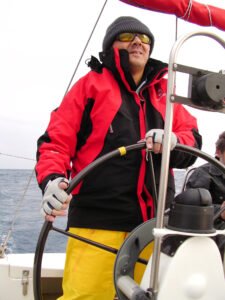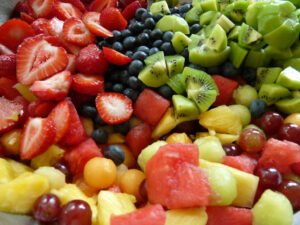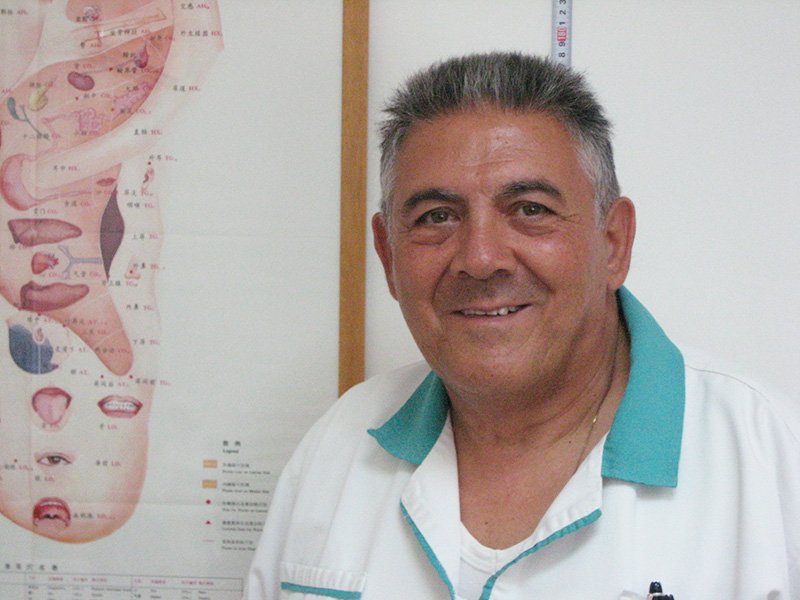THEO PANAYIDES meets a man who approaches life holistically believing it to be the best way to fight coronavirus and any other troubles, both mental and physical
Marios Smyrnios reminisces, sitting behind his desk at the International Research & Natural Therapy Centre in Nicosia. “I’ve been through a lot of difficult situations,” he says, “on both land and sea”. The ‘at sea’ part refers to the fact that he’s a sailor, and sailing instructor – he specialises in big yachts, the kind a sufficiently intrepid sailor could take around the world if so minded – when he’s not based here at the Centre, practising mostly naturopathy, acupuncture and hypnotherapy with sidelines in shiatsu, Chinese massage and aromatherapy.
What kind of difficult situations? He gives two examples. One story dates back to the early 00s, when a fire broke out at the Centre’s previous premises. The firefighters were unable to reach his second-floor office – so he had to stay there, along with five patients, waiting for the fire to be extinguished, and of course hoping it would be extinguished before it engulfed them. He recalls having to calm patients down as the blaze drew closer, then having to physically hold them back as they panicked and tried to jump out the window.
 The second story involves getting caught in a freak storm – not really out at sea, but while his boat was anchored in a cove. They weren’t able to escape in time, “so we spent the whole night fighting just to hold on, because we couldn’t get away… If we’d raised the anchor, or let go of the ropes, the waves would’ve lifted us up and smashed us against the rocks, we were just two metres from the rocks.” All he could do was keep the boat steady – it was far too dangerous to jump, or abandon ship – knowing that, if the anchor were to snap or the gales grew too strong, the vessel (and its captain) would be overcome and obliterated.
The second story involves getting caught in a freak storm – not really out at sea, but while his boat was anchored in a cove. They weren’t able to escape in time, “so we spent the whole night fighting just to hold on, because we couldn’t get away… If we’d raised the anchor, or let go of the ropes, the waves would’ve lifted us up and smashed us against the rocks, we were just two metres from the rocks.” All he could do was keep the boat steady – it was far too dangerous to jump, or abandon ship – knowing that, if the anchor were to snap or the gales grew too strong, the vessel (and its captain) would be overcome and obliterated.
It’s only later, driving away from the interview, that it suddenly occurs to me what those two stories have in common. Both are tales of being helpless, forced to sit tight – hanging on in the second story, literally doing nothing in the first one – while the elements rage all around, hoping they’ll be tamed or just wear themselves out. This is what Marios finds most difficult, both as a self-made man and a proponent of being responsible for one’s own wellbeing. It’s also, coincidentally, a big part of why Covid – the idea of the virus, even more than the virus itself – is so scary for many people, because it’s viewed (rightly or wrongly) as a disease we’re helpless to control. Some patients die, some are barely affected; it’s a matter of luck. Anyone can catch it, and there’s no treatment for those who do. All you can do is go home and wait – much like Marios and his patients waiting for the fire to subside – hoping the curse will somehow be lifted before it sends you to hospital.
We don’t talk much about the pandemic – but it certainly fits with the stuff we do talk about, and he certainly doesn’t subscribe to the idea of being helpless. “It’s not a matter of luck,” he insists. “The virus is there, we’re all going to breathe it in if someone [who’s infected] walks into a room. The question is how it gets handled by my defences, my body. That’s up to me.” He’s not against wearing masks, not at all (he actually thinks we’d do well to wear masks against the flu too), but the most effective way to block the virus is by being healthy. Marios is a doctor of natural therapy, advocating non-pharmaceutical medicine and looking at the self as a tripartite entity: mind, body and spirit.
But we hear so many stories of young, healthy people getting seriously ill, I point out.
We do, he agrees – and most people tend to think of themselves as being healthy, unless they have some specific reason to think otherwise. “When you look more deeply, though, are we really in good shape?” What about some busy young person who lives mostly on takeaways and doesn’t get enough pulses, fruit and vegetables, let alone supplements? (He recommends Vitamin D, Vitamin C, zinc, echinacea and probolis, both for Covid and in general.) What about someone “whose mental diet – whose psychology, in other words – is weighed down by problems all day”? Is such a person really as healthy as they think?
“This, after all, is my work here,” he declares earnestly, his square, suntanned face lit by the occasional toothy smile. “Can I train you to live a good, healthy life, both in mind and body?… Why does our religion – all religions, actually – have periods of detox, in other words fasting? Because they knew that people have to pause for a while, so the body can be cleansed. And prayer – we’re told we have to pray. Why? Because we need to feed the spirit too… To go into a state of relaxation, of ecstasy”. I’m a bit surprised to find religion making an appearance, despite the icon strategically placed behind his desk – but Marios is devout, not necessarily the kind of Christian who goes to church every Sunday but certainly the kind who goes (or used to go) to Mount Athos once or twice a year, living with the monks for a few days. “There’s nothing there,” he recalls with reverence. “The day begins and ends with humility, with prayer. There’s no money, nothing. It’s just you and – and God.”
There’s a good deal of the monk about him – though not just a monk but a teacher too, the ascetic zeal of the former softened by the forthright, ingratiating manner of the latter. (He’s actually taught self-awareness classes, as well as the sailing.) His lifestyle is revealing, because he’s not militant in theory – as a pure monk would be – yet extremely militant in practice. Marios is vegetarian, and has been since the age of 20 (he turned 63 in January), yet not actually vegan; he’ll eat dairy products now and then, he claims good-naturedly – yet his diet is austere, to put it mildly. Breakfast is fruit; dinner, on most occasions, is also fruit. (“Now, in summer, I have my watermelon. What could be nicer?”) Lunch is invariably pulses and vegetables. “Today I had a wonderful meal of various boiled vegetables – artichokes, carrots, green beans – in a nice salad, with a tiny splash of oil.” The veggies might be served with a side salad (lettuce, cabbage, that sort of thing) or all mixed together. Carnivores are unlikely to feel it makes much difference.
 His stance on alcohol is even more self-disciplined. The classic monk archetype is the righteous teetotaller, holding forth on the evils of drink – yet Marios doesn’t scold or preach, indeed “I consider myself an aficionado of fine wine. Choosing it, going to the cellar to find it, opening the bottle, getting the glasses and so on. I’ll sniff it, I might taste it…” Drinking it, however, is less of a hobby; he might have one glass if he’s with friends, maybe two once in a blue moon – and of course never when he’s sailing, or on the day before. “That’s just how I am,” he explains. “I don’t deprive myself of anything… It’s not like I’m making a choice [not to drink] and I’m depriving myself”. Monks have their sackcloths and hairshirts, to remind themselves of their vocation – but Marios doesn’t need such reminders, because the vocation comes naturally. It’s part of why he’s a good teacher.
His stance on alcohol is even more self-disciplined. The classic monk archetype is the righteous teetotaller, holding forth on the evils of drink – yet Marios doesn’t scold or preach, indeed “I consider myself an aficionado of fine wine. Choosing it, going to the cellar to find it, opening the bottle, getting the glasses and so on. I’ll sniff it, I might taste it…” Drinking it, however, is less of a hobby; he might have one glass if he’s with friends, maybe two once in a blue moon – and of course never when he’s sailing, or on the day before. “That’s just how I am,” he explains. “I don’t deprive myself of anything… It’s not like I’m making a choice [not to drink] and I’m depriving myself”. Monks have their sackcloths and hairshirts, to remind themselves of their vocation – but Marios doesn’t need such reminders, because the vocation comes naturally. It’s part of why he’s a good teacher.
His character defines his healthy habits, not vice versa. Most people like the feeling of losing control occasionally. They enjoy the naughty pleasure of an extra drink, or a cigarette or a greasy takeaway, even while knowing it’s bad for them; it’s their treat, their reward for being virtuous the rest of the time. Marios doesn’t seem to be like that. Virtue, for him, is its own reward. He doesn’t enjoy losing control (maybe it’s too close to feeling helpless, hence his ‘difficult situations’) and doesn’t have that self-destructive side. His outlook is entirely self-constructive.
He is, after all, a self-made man, a top student from a humble background (his dad was a builder, his mother worked in the fields in Deftera) who always wanted to study medicine – he hoped to become a gynaecologist – and actually secured a university place but was forced to withdraw, due to lack of money. He became a mechanic instead, going to technical school and spending his 20s at a road rescue company, helping stranded motorists (his wife was also at the company; they married in 1979, and have two sons) – but the lure of medicine gnawed away at him and he made the move in 1987, studying natural therapy followed by a few months in China to study acupuncture (he was in Changsha, in Hunan province). The trip to China was on a scholarship; he’s never had the luxury of money to spend. “Everything I’ve done, I’ve had to fight for,” he says soberly. “With a lot of struggle, and a lot of failure.”
Failure is part of life, of course. “If a child walks without ever falling down, someday he’ll fall when he’s grown up – and then it’ll hurt, because he won’t have learned that when you fall, you have to get up again,” he intones, his years of self-awareness studies coming out in frequent adages and aphorisms. (Does he have any regrets? “The fried egg cannot be un-fried.”) Failure, and struggle, are part of life – which is where he diverges slightly from the usual New Age stereotype, his working-class background making him more pragmatic, less of an ideologue. He’s not, as already mentioned, a militant vegan, despite eating healthier than most vegans – and he’s not militant about conventional medicine either, indeed he believes the two go together; patients can still take drugs, as prescribed by their doctors, their treatment is merely reinforced by natural therapy. His approach beats a different path to the same goal. In China they use acupuncture to treat headaches, and would look at you strangely if you asked for Panadol; in the West, it’s the other way round.
So what kind of issues does he deal with here? “Everything,” he replies with a shrug. “Stress. Insomnia. IBS, or spastic colitis – which comes from stress. Musculoskeletal problems, back pain, neck pain, tennis elbow. People who are obese, people who have migraines”. Migraines barely even require acupuncture anymore, he reports, most can be fixed with a good cleanse and some herbs and vitamins. “Women with polycystic ovaries, that’s become a real scourge at younger ages. Fatty liver, that’s another common problem.” Clearly, Cypriots have moved on from the old days when non-pharmaceutical remedies were decried as nonsense and charlatanism – and Marios is keen to stress that things like detox and herb medicine now come backed by science and university studies; yet there’s still a difference, and it’s an important one.
“Let me explain it scientifically,” he begins when I ask how acupuncture works – but his explanation involves Chi, the invisible energy coursing through our bodies (an equivalent to the soul, one might say), which is still not quite part of Western science. Marios’ message is simple enough: body, mind and spirit, any one of which can block your energy and cause a disruption in the flow. All three are equally important – so eat well and exercise, for your body’s sake, but also feed your mind with calmness and positivity (pausing the mind every day for a few minutes, “thinking of nothing at all”, is also healthy) and don’t neglect your spiritual side. His approach is holistic – and reflected in his own life with its calm, earnest, lightly didactic style, preaching moderation and taking an apparently sincere delight in good habits. Sun and sea, a taste (but no more) of fine wine, a slice of watermelon in the evenings: “What could be nicer?”.
Is there still a part of him that wishes he’d gone to university and made a ton of money as the ‘other’ kind of doctor? Possibly. But Marios Smyrnios seems philosophical. “What is happiness?” he asks rhetorically. “Happiness isn’t a continuous line, it’s a lot of little dots strung together. The more happy moments you have, that’s what makes up your happiness line – but it’s not a continuous line.” Yin and yang, health and Covid, joys and successes – but failures too, and difficult situations. It’s only natural.


